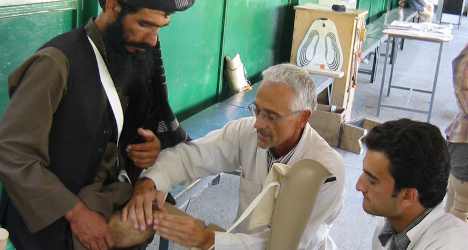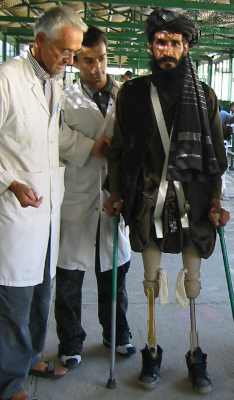The Italian 'injecting hope' in Afghanistan

Physiotherapist Alberto Cairo has spent more than two decades working with the Red Cross in Afghanistan. He talks to The Local about regime change, rehabilitation and the man who changed his life.
Alberto Cairo heads up the International Committee of the Red Cross’ (ICRC) orthopaedic programmes in Afghanistan, overseeing the organization’s work with people suffering from physical disabilities. Based in the country’s capital Kabul, he oversees a nationwide team of 750 that sees hundreds of patients every day.
December 3rd marked International Day of Persons with Disabilities, giving The Local the chance to find out how Italians are making a difference. Speaking from Kabul, Cairo explains how he came to be in Afghanistan and what life is like working within the fragile state.

How did you come to be in Afghanistan?
One of my dreams was to be a physiotherapist and I liked travelling, so I thought why not put the two together with a humanitarian mission.
After three years working in Juba [now capital of South Sudan] with an Italian organization, I returned to Italy and wrote to the Red Cross. I was lucky and got an interview; at the last moment they told me the job was in Afghanistan and without much thinking, I said yes.
I knew it could be dangerous but I was convinced that I could learn and do something good.
What were your first impressions of Kabul?
At the time Kabul was under a regime that was at its end, because the major towns were surrounded by Mujahideen [Islamic fighters]. A major change was in the air.
I was assigned to a hospital for war victims; I was quite shocked to see how many patients were coming in every day, mainly landmine victims.
I had the impression that Kabul was the place where I wanted to be. It was a very strange feeling in such a sad place, but I felt I was useful.
What happened when the government was overthrown?
In 1992, when the Mujahideen took control of the country, the orthopedic centre was closed and I left to spend a month in Italy.
I returned to Afghanistan with the ICRC to work with homeless people. It was extremely sad, the conditions were absolutely appalling and people were fighting over pieces of firewood. People were deprived of their dignity, it was really terrible.
What made you decide to reopen the orthopedic centre?
In January 1994 I was driving home when a rocket fell. Everyone ran apart from a man in a wheelchair and his son, who was no older than eight.
The man had no legs and just one arm; when I asked him why he didn’t have artificial legs he said it was because the ICRC had closed. Without thinking I said, “Come tomorrow and we will help you”.
I went very early the next morning and, to my surprise, the man, Mahmood, was already there with his son Rafi and around 20 other disabled people. I was astonished.
The gatekeeper told me that they came every day to see if we were going to reopen the centre.
After that I convinced my bosses to open again.
What happened to Mahmood?
After a couple of months of rehabilitation, on his last day at the centre, the Mujahideen started fighting so we had to run away to a shelter.
I remember that Mahmood was running with his son, who said: “Father, you are faster than me!”
I heard his father say, “Look, now I can walk! You can go to school!”
Then I saw them going home, pushing the empty wheelchair, it was a kind of epiphany that really changed my life.
This man received new legs and got his dignity back.
What has happened since then?
We never closed again. Apart from a couple of hours in 1995 and 1996, we’ve stayed open ever since.
Now we receive at least 350 patients every day; it’s a never-ending job.
We have 7,500 new patients every year, of which only around 1,000 are war victims.
The rest include children with deformities, people with other disabilities or survivors of car accidents.
How have you developed the Kabul centre?
We started a positive discrimination policy and now we only employ and train disabled people. It’s fantastic.
Now everyone you come across - from the person opening the gate, to the person at the admission desk or the physiotherapist - has a disability.
If you are a person coming in for the first time, you see that all the people working there are like you. You get an injection of hope.
What else can patients do?
In 2010, we started a sports programme. We have just opened a new gym and had the first girls’ wheelchair basketball practice inside. It was quite emotional. Sport is the perfect combination of physical rehabilitation and social integration; it’s an incredible tool.
Do you ever feel like leaving Kabul?
Never. My team really make a difference; I feel that this is really where I want to be.
SEE ALSO: 'When I see children hurt, there's no room for fear'
Don't miss a story about Italy - Join us on Facebook and Twitter.
Comments
See Also
Alberto Cairo heads up the International Committee of the Red Cross’ (ICRC) orthopaedic programmes in Afghanistan, overseeing the organization’s work with people suffering from physical disabilities. Based in the country’s capital Kabul, he oversees a nationwide team of 750 that sees hundreds of patients every day.
December 3rd marked International Day of Persons with Disabilities, giving The Local the chance to find out how Italians are making a difference. Speaking from Kabul, Cairo explains how he came to be in Afghanistan and what life is like working within the fragile state.
How did you come to be in Afghanistan?
One of my dreams was to be a physiotherapist and I liked travelling, so I thought why not put the two together with a humanitarian mission.
After three years working in Juba [now capital of South Sudan] with an Italian organization, I returned to Italy and wrote to the Red Cross. I was lucky and got an interview; at the last moment they told me the job was in Afghanistan and without much thinking, I said yes.
I knew it could be dangerous but I was convinced that I could learn and do something good.
What were your first impressions of Kabul?
At the time Kabul was under a regime that was at its end, because the major towns were surrounded by Mujahideen [Islamic fighters]. A major change was in the air.
I was assigned to a hospital for war victims; I was quite shocked to see how many patients were coming in every day, mainly landmine victims.
I had the impression that Kabul was the place where I wanted to be. It was a very strange feeling in such a sad place, but I felt I was useful.
What happened when the government was overthrown?
In 1992, when the Mujahideen took control of the country, the orthopedic centre was closed and I left to spend a month in Italy.
I returned to Afghanistan with the ICRC to work with homeless people. It was extremely sad, the conditions were absolutely appalling and people were fighting over pieces of firewood. People were deprived of their dignity, it was really terrible.
What made you decide to reopen the orthopedic centre?
In January 1994 I was driving home when a rocket fell. Everyone ran apart from a man in a wheelchair and his son, who was no older than eight.
The man had no legs and just one arm; when I asked him why he didn’t have artificial legs he said it was because the ICRC had closed. Without thinking I said, “Come tomorrow and we will help you”.
I went very early the next morning and, to my surprise, the man, Mahmood, was already there with his son Rafi and around 20 other disabled people. I was astonished.
The gatekeeper told me that they came every day to see if we were going to reopen the centre.
After that I convinced my bosses to open again.
What happened to Mahmood?
After a couple of months of rehabilitation, on his last day at the centre, the Mujahideen started fighting so we had to run away to a shelter.
I remember that Mahmood was running with his son, who said: “Father, you are faster than me!”
I heard his father say, “Look, now I can walk! You can go to school!”
Then I saw them going home, pushing the empty wheelchair, it was a kind of epiphany that really changed my life.
This man received new legs and got his dignity back.
What has happened since then?
We never closed again. Apart from a couple of hours in 1995 and 1996, we’ve stayed open ever since.
Now we receive at least 350 patients every day; it’s a never-ending job.
We have 7,500 new patients every year, of which only around 1,000 are war victims.
The rest include children with deformities, people with other disabilities or survivors of car accidents.
How have you developed the Kabul centre?
We started a positive discrimination policy and now we only employ and train disabled people. It’s fantastic.
Now everyone you come across - from the person opening the gate, to the person at the admission desk or the physiotherapist - has a disability.
If you are a person coming in for the first time, you see that all the people working there are like you. You get an injection of hope.
What else can patients do?
In 2010, we started a sports programme. We have just opened a new gym and had the first girls’ wheelchair basketball practice inside. It was quite emotional. Sport is the perfect combination of physical rehabilitation and social integration; it’s an incredible tool.
Do you ever feel like leaving Kabul?
Never. My team really make a difference; I feel that this is really where I want to be.
SEE ALSO: 'When I see children hurt, there's no room for fear'
Don't miss a story about Italy - Join us on Facebook and Twitter.
Join the conversation in our comments section below. Share your own views and experience and if you have a question or suggestion for our journalists then email us at [email protected].
Please keep comments civil, constructive and on topic – and make sure to read our terms of use before getting involved.
Please log in here to leave a comment.